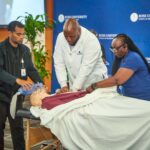Cases of dengue virus continue to surge in Hawaii, with the state recently reporting the 12th case so far this year.
One case was confirmed on the island of Maui, with the remaining 11 occurring on Oahu.
In the latest case, the person was exposed while traveling in a region where dengue is common, the Hawaii Department of Health (DOH) reported.
TIGER MOSQUITOES BLAMED FOR SPREAD OF DENGUE FEVER: ‘MOST INVASIVE SPECIES’
Dengue fever is a virus spread through bites from an infected mosquito.
It is common in the Americas, Africa, the Middle East, Asia and the Pacific Islands, as well as many Caribbean destinations, according to the Centers for Disease Control and Prevention (CDC).
Other countries reporting spikes in dengue fever include Mexico, Fiji, French Polynesia, Tonga, Samoa, the Philippines, Colombia and Brazil. Puerto Rico also has an ongoing dengue outbreak, along with American Samoa.
In 2024, there were 1,984 dengue cases in the U.S., according to CDC data.
While mosquitoes carrying dengue may be present in Hawaii, the disease is "not endemic" in the state, the DOH stated, adding that "cases are currently limited to travelers."
Typical symptoms of dengue include aches and pains (in the eyes, muscles, joints, or bones), nausea, vomiting and rash — usually experienced within two weeks of being bitten.
Most people experience symptoms for two to seven days before recovering.
DENGUE FEVER CASES RISING IN POPULAR SPRING BREAK LOCATIONS, CDC ALERTS
"It’s typically a more mild illness, but can be severe, causing headaches, joint pain, fever, abdominal pain and even death," Dr. Mark Fischer, regional medical director of International SOS, a leading medical and security services company, previously told Fox News Digital.
There is not currently any medication to treat dengue, according to the CDC.
Infected people are advised to rest, take acetaminophen for pain and fever, stay hydrated and see a doctor.
There is a vaccine available for U.S. children between 9 and 16 years of age who have previously tested positive for dengue and are living in areas where the infection is common.
In its alert, the Hawaii DOH called for travelers returning from dengue-endemic areas to take precautions to prevent mosquito bites for three weeks.
"If dengue symptoms develop within two weeks of return, travelers should seek medical evaluation," the health agency advised.
Experts also recommend eliminating standing water where mosquitoes breed. Some examples include buckets, water-catching plants (such as bromeliads), small containers, planters, rain barrels and even cups left outside, per the DOH.
"Pouring out containers of standing water can significantly reduce the potential for mosquito breeding," the agency stated.
Fischer added, "It’s important to wear insect repellent that contains DEET, picaridin or lemon and eucalyptus oil, as these ingredients are the most effective at repelling mosquitoes and other insects."
"Those who live in areas with mosquito populations should try to wear long-sleeved shirts and long pants, especially at dusk and in the evening, when mosquitoes are most active, to avoid getting bitten on exposed skin."
CLICK HERE TO SIGN UP FOR OUR HEALTH NEWSLETTER
Keeping screens on windows and doors is also a good way to prevent insects from entering and potentially causing the spread of disease, he said.
"If you live in an area that has a high level of mosquito-borne diseases, you should use mosquito nets when sleeping and eliminate any standing water in and around the home, since still bodies of water are breeding grounds for the insects," Fischer added.
For more Health articles, visit www.foxnews/health
Experts recommend using EPA-registered insect repellent when spending time outdoors in areas where mosquitoes and ticks are prevalent.
Those who are spending prolonged time outdoors should consider treating their clothing with permethrin, which helps to repel insects.

